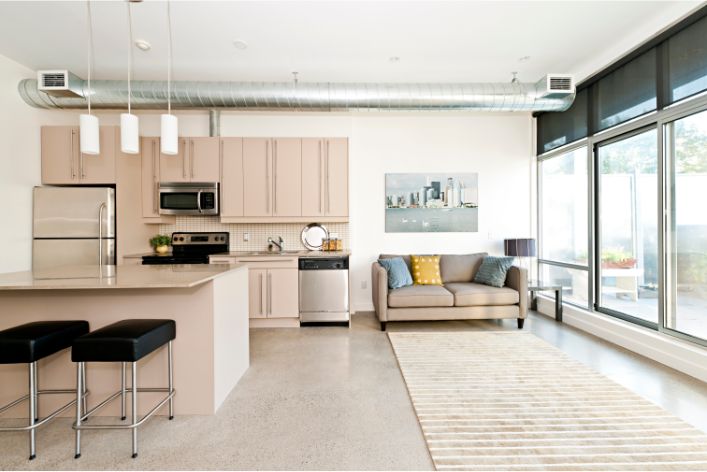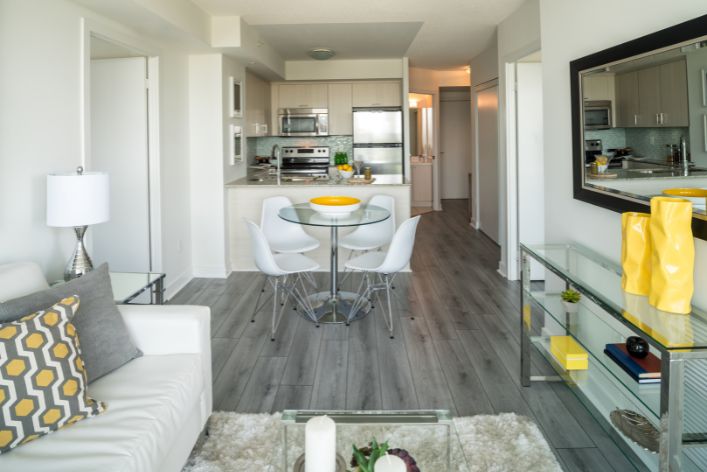
1. Introduction
Condominiums, or condos for short, are a popular form of housing that offer many benefits to those looking for a place to call home. A condo is essentially an individually owned unit within a larger complex or building. While the owner has ownership of their individual unit, they also share ownership of common areas such as hallways, elevators, and other amenities with other unit owners.
The purpose of this blog post is to provide prospective buyers with a comprehensive guide on the ten things to consider before buying a condo. While condos offer many advantages, such as low maintenance and access to amenities, there are also potential drawbacks that buyers should be aware of.
This blog post will cover essential considerations such as location, affordability, size and layout, building and community amenities, maintenance and repairs, rules and regulations, financial stability of the condo association, legal considerations, and future plans.
By the end of this post, readers will have a solid understanding of what to look for and what to avoid when searching for a condo. With this knowledge, buyers can make informed decisions that align with their needs, preferences, and long-term goals.
Whether you’re a first-time homebuyer or an experienced real estate investor, the information presented in this blog post will provide valuable insights and guidance to help you navigate the condo-buying process with confidence. Let’s get started!
Read: 10 Questions to Ask Your Landlord Before Signing a Lease
2. Location
One of the most important factors to consider when buying a condo is its location. The location of a condo can greatly impact its value, as well as your quality of life as a resident. Here are the top three things to consider when evaluating the location of a condo:
A. Access to Transportation
- Proximity to public transportation: If you rely on public transportation to get around, it’s important to choose a condo that’s conveniently located near transit stops or stations. Look for condos that are within walking distance of bus or train routes, or have easy access to major highways.
- Parking availability: If you own a car, make sure the condo you’re considering has adequate parking. This may include a parking lot or garage, or designated street parking. Consider the cost of parking, and whether it’s included in the condo fees.
B. Proximity to Amenities such as Restaurants and Shopping
- Walkability: One of the biggest advantages of condo living is the ability to walk to nearby amenities. Look for condos that are located within walking distance of restaurants, cafes, grocery stores, and other shops.
- Entertainment options: Consider the availability of entertainment options in the area, such as movie theaters, museums, and parks. Look for condos that are located near these types of attractions, as they can greatly enhance your quality of life.
C. Safety and Security of the Neighborhood
- Crime rates: Before buying a condo, research the crime rates in the neighborhood. Look for areas with low rates of violent and property crime. This information can be found online or by contacting the local police department.
- Security features: Evaluate the security features of the condo complex, such as security cameras, locked entrances, and on-site security personnel. These features can provide peace of mind and help prevent crime.
In summary, the location of a condo is an essential factor to consider when making a purchasing decision. Look for condos that offer easy access to transportation, proximity to amenities such as restaurants and shopping, and a safe and secure neighborhood. By taking these factors into consideration, you can find a condo that meets your needs and enhances your lifestyle as a resident.
Read: Are there Benefits to Renting a Luxury Apartment?
3. Affordability
Buying a condo is a significant financial investment, and it’s essential to carefully consider the affordability of the property before making a purchase. Here are three factors to keep in mind when evaluating the affordability of a condo:
A. Price of the Condo
- Set a budget: Before you begin searching for a condo, it’s important to establish a budget. Determine how much you can comfortably afford to spend on a monthly mortgage payment.
- Research comparable properties: Look at the prices of comparable condos in the area to ensure that the price of the property you’re considering is reasonable. If a condo is priced significantly higher than similar properties, it may not be worth the investment.
B. Additional Costs such as HOA Fees
- Understand the fees: In addition to the price of the condo, it’s important to factor in additional costs such as homeowners association (HOA) fees. HOA fees can vary widely depending on the property, so it’s essential to understand how much you’ll be paying each month.
- Evaluate the value: Evaluate what the HOA fees cover, such as maintenance and amenities, and determine whether the cost is reasonable based on the value provided.
C. Resale Value of the Condo
- Consider the future: While it’s important to focus on the current affordability of a condo, it’s also important to consider its future resale value. Research the potential for property appreciation in the area.
- Look for factors that can impact resale value: Evaluate factors such as location, demand for the property, and the condition of the condo to determine its potential for resale value.
In short, affordability is a critical consideration when buying a condo. Take the time to establish a budget, understand the costs associated with the property, and evaluate the potential for future resale value. By doing so, you can make an informed decision that aligns with your financial goals and ensures that the condo you choose is a sound investment.
Read: The Pros and Cons of Renting vs Buying a Home
4. Size and layout
The size and layout of a condo can greatly impact its livability and comfort. It’s important to evaluate the number of bedrooms and bathrooms, overall square footage, and layout and design of a condo before making a purchase. Here are three things to consider when evaluating the size and layout of a condo:
A. Number of Bedrooms and Bathrooms
- Determine your needs: Consider the number of people who will be living in the condo and their needs. Determine how many bedrooms and bathrooms are required to comfortably accommodate everyone.
- Consider future needs: Think about your future needs, such as the possibility of having children or hosting guests. Choose a condo with enough bedrooms and bathrooms to meet your current and future needs.
B. Overall Square Footage
- Evaluate the space: Look at the overall square footage of the condo and evaluate the space. Consider the size of the rooms, closets, and storage space.
- Don’t sacrifice quality for size: While it may be tempting to choose a condo with a larger square footage, don’t sacrifice quality for size. Choose a condo with quality finishes and features, even if it means sacrificing some square footage.
C. Layout and Design of the Condo
- Evaluate the flow: Consider the layout of the condo and evaluate the flow of the space. Determine if the layout is functional and if it suits your lifestyle.
- Look for unique features: Look for unique features such as high ceilings, large windows, or outdoor space. These features can greatly enhance the livability of the condo.
In short, the size and layout of a condo are essential considerations when making a purchasing decision. Evaluate the number of bedrooms and bathrooms, overall square footage, and layout and design of the condo to ensure that it meets your needs and enhances your lifestyle as a resident. By taking these factors into consideration, you can find a condo that provides the perfect balance of comfort and functionality.
Read: Maximizing Your Home’s Value: Top Renovations to Consider

5. Building and community amenities
Building and community amenities can greatly enhance the livability and enjoyment of a condo. When evaluating a condo, it’s important to consider the availability of parking, fitness center, pool, and other amenities, as well as community events and activities. Here are three things to consider when evaluating building and community amenities:
A. Availability of Parking
- Determine parking needs: Consider your parking needs and evaluate the availability of parking at the condo complex. Determine if the condo comes with a parking spot, and whether additional parking is available for guests.
- Evaluate the cost: Evaluate the cost of parking at the condo complex. Determine if the cost is reasonable and if it fits within your budget.
B. Fitness Center, Pool, and Other Amenities
- Look for quality: Evaluate the quality of the fitness center, pool, and other amenities. Determine if they are well-maintained and up to your standards.
- Evaluate the cost: Determine the cost of accessing these amenities. Evaluate if the cost is reasonable and if it provides good value for the money.
C. Community Events and Activities
- Evaluate community events: Evaluate the frequency and quality of community events and activities. Determine if they align with your interests and if they are well-attended.
- Evaluate community engagement: Evaluate the level of community engagement and whether it suits your lifestyle. Consider if the community is welcoming and if it provides a sense of belonging.
Ultimately, building and community amenities can greatly enhance the livability and enjoyment of a condo. Evaluate the availability of parking, fitness center, pool, and other amenities, as well as community events and activities to ensure that the condo you choose aligns with your lifestyle and enhances your quality of life as a resident. By taking these factors into consideration, you can find a condo that provides a comfortable and enjoyable living experience.
6. Maintenance and repairs
Maintenance and repairs are important considerations when buying a condo. While condos offer low-maintenance living, it’s important to understand your responsibility for maintenance and repairs, the age of the building and potential for repairs, and the availability of a property manager. Here are three things to consider when evaluating maintenance and repairs:
A. Responsibility for Maintenance and Repairs
- Understand the condo association’s responsibility: Determine what the condo association is responsible for in terms of maintenance and repairs. This may include common areas, exterior maintenance, and major repairs.
- Understand your responsibility: Determine what you are responsible for in terms of maintenance and repairs. This may include routine maintenance, interior repairs, and minor repairs.
B. Age of the Building and Potential for Repairs
- Evaluate the age of the building: Evaluate the age of the building and determine if it’s new or has been around for several years. Newer buildings typically require less maintenance and repairs.
- Look for potential repairs: Look for potential repairs that may be required in the future, such as repairs to the roof, HVAC system, or plumbing. Consider the cost of these repairs and whether they fit within your budget.
C. Availability of a Property Manager
- Determine if a property manager is available: Determine if a property manager is available to assist with maintenance and repairs. A property manager can help ensure that repairs are completed quickly and efficiently.
- Evaluate the cost: Evaluate the cost of having a property manager. Determine if the cost is reasonable and if it fits within your budget.
In a nutshell, maintenance and repairs are important considerations when buying a condo. Evaluate your responsibility for maintenance and repairs, the age of the building and potential for repairs, and the availability of a property manager to ensure that the condo you choose is well-maintained and provides a comfortable living experience. By taking these factors into consideration, you can make an informed decision and ensure that your condo provides a low-maintenance and stress-free living experience.
Read: The Impact of Location on Real Estate Prices and Demand
7. Rules and regulations
When buying a condo, it’s important to be aware of the rules and regulations that govern the community. Rules and regulations can include restrictions on noise and pets, rules for remodeling and renovations, and consequences for breaking the rules. Here are three things to consider when evaluating rules and regulations:
A. Restrictions on Noise and Pets
- Evaluate noise restrictions: Evaluate the noise restrictions in the community, such as quiet hours or restrictions on loud music. Determine if the restrictions align with your lifestyle.
- Evaluate pet restrictions: Evaluate the pet restrictions in the community, such as breed or size restrictions. Determine if the restrictions align with your pet ownership needs.
B. Rules for Remodeling and Renovations
- Determine what modifications are allowed: Determine what modifications are allowed in the condo, such as changes to the flooring or wall color. Determine if the rules align with your renovation plans.
- Determine approval process: Determine the approval process for modifications, such as obtaining permission from the condo association or property manager. Determine if the process is reasonable and efficient.
C. Consequences for Breaking Rules
- Determine the consequences: Determine the consequences for breaking the rules and regulations in the community. This may include fines or other penalties.
- Determine enforcement: Determine how the rules are enforced in the community. Determine if the enforcement is consistent and fair.
In closing, rules and regulations are important considerations when buying a condo. Evaluate the restrictions on noise and pets, rules for remodeling and renovations, and consequences for breaking the rules to ensure that the condo you choose aligns with your lifestyle and meets your needs as a resident. By taking these factors into consideration, you can ensure that you are a responsible member of the community and that your condo provides a comfortable and enjoyable living experience.
Read: How to Invest in Real Estate without Buying Property
8. Financial stability of the condo association
The financial stability of the condo association is an important factor to consider when buying a condo. A financially stable condo association ensures that there is sufficient funding to maintain the property and cover unexpected expenses. Here are three things to consider when evaluating the financial stability of the condo association:
A. Financial Statements and Reserves
- Evaluate the financial statements: Evaluate the financial statements of the condo association to determine its financial health. Look for trends in revenue and expenses, as well as the amount of reserves.
- Evaluate the reserves: Evaluate the reserves of the condo association to determine if there is enough money set aside to cover unexpected expenses. Look for the amount of reserves per unit, and compare it to other condo associations in the area.
B. History of Special Assessments
- Determine if there has been a history of special assessments: Determine if the condo association has a history of special assessments. Special assessments are additional fees charged to unit owners to cover unexpected expenses.
- Evaluate the frequency and cost of special assessments: Evaluate the frequency and cost of special assessments in the past. Determine if they were necessary and if they were reasonable in cost.
C. Professional Management of the Association
- Determine if the condo association is professionally managed: Determine if the condo association is professionally managed. Professional management ensures that the property is maintained and that the finances are managed effectively.
- Evaluate the reputation of the management company: Evaluate the reputation of the management company that the condo association works with. Look for online reviews and ask other residents about their experience with the management company.
In review, the financial stability of the condo association is an important consideration when buying a condo. Evaluate the financial statements and reserves, history of special assessments, and professional management of the association to ensure that the condo association is financially stable and able to provide a comfortable and enjoyable living experience. By taking these factors into consideration, you can ensure that your investment in the condo is a sound one and that your living experience is worry-free.
Read: 10 Useful Tips For First-Time Home Buyers
9. Legal considerations
When buying a condo, it’s important to understand the legal considerations involved. Legal considerations include reviewing condo association documents, understanding common area and individual unit ownership, and understanding the role of the board of directors. Here are three things to consider when evaluating legal considerations:
A. Review of the Condo Association Documents
- Request copies of the documents: Request copies of the condo association documents, including the bylaws, covenants, conditions, and restrictions (CC&Rs), and the rules and regulations.
- Review the documents: Review the documents carefully to ensure that you understand the rules and regulations of the condo association. Determine if there are any restrictions or regulations that may impact your ability to live comfortably in the community.
B. Understanding of Common Area and Individual Unit Ownership
- Understand common area ownership: Understand the ownership of common areas, such as hallways, elevators, and parking areas. Determine who is responsible for maintaining these areas.
- Understand individual unit ownership: Understand the ownership of individual units and the responsibility of unit owners to maintain their units. Determine if there are any restrictions on modifications to the unit.
C. Role of the Board of Directors
- Determine the role of the board of directors: Determine the role of the board of directors in managing the condo association. Look for information on how board members are elected and how decisions are made.
- Evaluate the board’s performance: Evaluate the performance of the board of directors by reviewing meeting minutes and other documentation. Look for signs of effective leadership and management.
In summary, legal considerations are an important part of buying a condo. Evaluate the review of condo association documents, understanding of the common area and individual unit ownership, and understanding of the role of the board of directors to ensure that you are making an informed decision about your investment in the condo. By taking these factors into consideration, you can ensure that your purchase is a sound one and that your living experience is enjoyable and worry-free.
Read: Real Estate Marketing: Everything You Need To Know
10. Future plans
When buying a condo, it’s important to consider the future plans for the condo association and the surrounding area. Future plans can include long-term plans for the condo association, potential for new developments in the area, and your personal long-term goals. Here are three things to consider when evaluating future plans:
A. Long-Term Plans for the Condo Association
- Determine the long-term plans for the condo association: Determine if the condo association has long-term plans for maintenance, repairs, and upgrades. Look for information on planned projects and improvements.
- Evaluate the financial plan: Evaluate the financial plan for the condo association to ensure that it has adequate funding to support long-term plans. Look for information on reserves and special assessments.
B. Potential for New Developments in the Area
- Evaluate the potential for new developments: Evaluate the potential for new developments in the surrounding area. Look for information on zoning and land use plans.
- Consider the impact on the community: Consider the impact that new developments may have on the community. Determine if they align with your personal values and needs.
C. Personal Long-Term Goals
- Determine your personal long-term goals: Determine your personal long-term goals and how they align with the condo and surrounding area. Consider factors such as location, amenities, and community.
- Evaluate the potential for meeting your goals: Evaluate the potential for meeting your personal long-term goals in the condo and surrounding area. Look for factors such as access to transportation, proximity to amenities, and potential for growth and development.
In summary, future plans are an important consideration when buying a condo. Evaluate the long-term plans for the condo association, the potential for new developments in the area, and your personal long-term goals to ensure that the condo you choose aligns with your values and needs. By taking these factors into consideration, you can ensure that your investment in the condo provides a comfortable and enjoyable living experience for years to come.
Conclusion
Buying a condo is a significant investment that requires careful consideration. By evaluating the ten things to consider before buying a condo, including location, affordability, size and layout, building and community amenities, maintenance and repairs, rules and regulations, financial stability of the condo association, legal considerations, and future plans, you can make an informed decision that meets your needs and aligns with your values.
It’s important to remember that buying a condo is not a decision that should be taken lightly. Taking the time to carefully evaluate all of the factors involved can help ensure that you make the best decision for your lifestyle and budget.
We Design & Develop Websites, Android & iOS Apps
Looking to transform your digital presence? We specialize in creating stunning websites and powerful mobile apps for Android and iOS. Let us bring your vision to life with innovative, tailored solutions!
Get Started TodayBefore making a decision, it’s also important to consult with a real estate professional who can provide guidance and insight into the condo market in your area. They can help you understand the pros and cons of different properties and provide advice on negotiating the best deal.
On a final note, buying a condo can be a great investment that provides a comfortable and enjoyable living experience. By carefully considering the ten things outlined in this post and seeking guidance from a real estate professional, you can make an informed decision that meets your needs and aligns with your values.
Before You Go…
Hey, thank you for reading this blog to the end. I hope it was helpful. Let me tell you a little bit about Nicholas Idoko Technologies. We help businesses and companies build an online presence by developing web, mobile, desktop, and blockchain applications.
We also help aspiring software developers and programmers learn the skills they need to have a successful career. Take your first step to become a programming boss by joining our Learn To Code academy today!
Be sure to contact us if you need more information or have any questions! We are readily available.
Put Your Tech Company on the Map!
Get featured on Nicholas Idoko’s Blog for just $200. Showcase your business, boost credibility, and reach a growing audience eager for tech solutions.
Publish Now










